【单元考点培优】Unit 1 Know yourself 专题07 句型转换-2025-2026学年九年级英语上册单元复习考点培优牛津译林版(含答案解析)
文档属性
| 名称 | 【单元考点培优】Unit 1 Know yourself 专题07 句型转换-2025-2026学年九年级英语上册单元复习考点培优牛津译林版(含答案解析) |
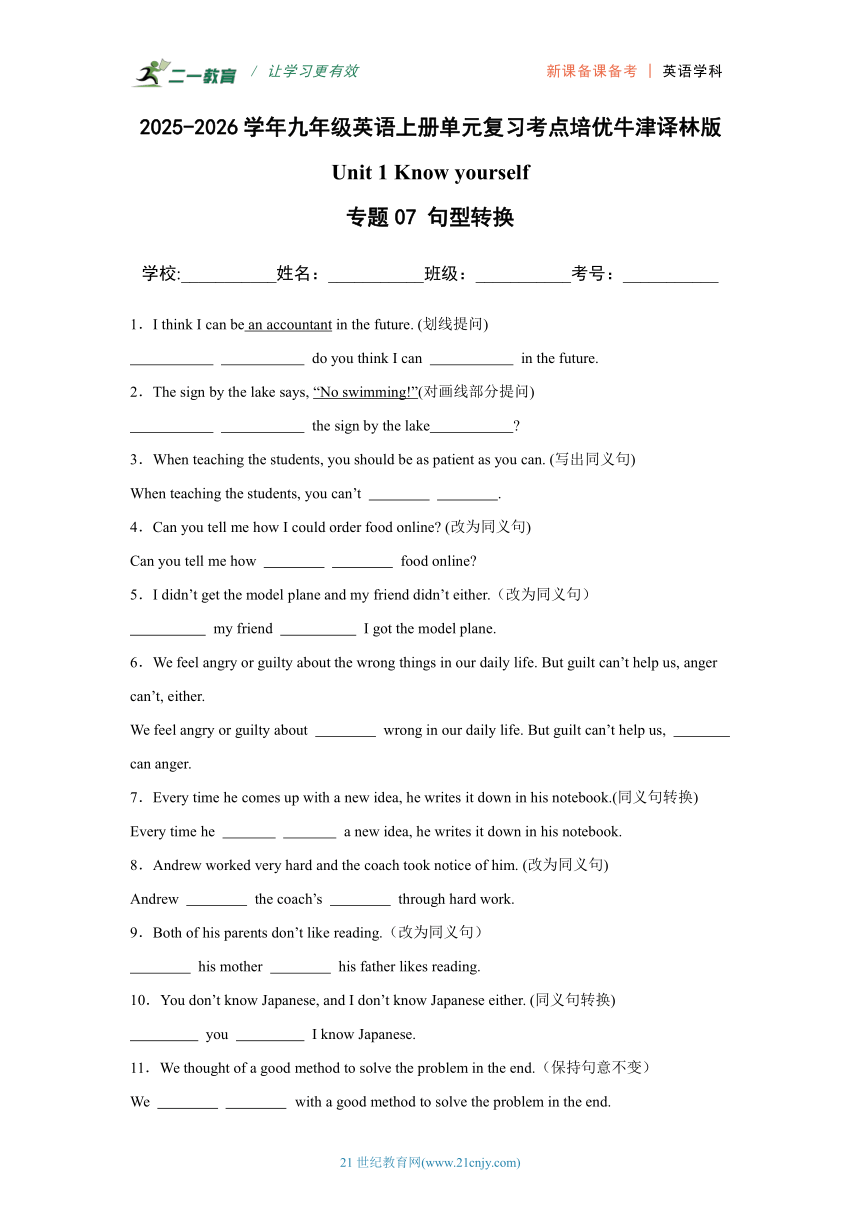
|
|
| 格式 | docx | ||
| 文件大小 | 52.3KB | ||
| 资源类型 | 试卷 | ||
| 版本资源 | 牛津译林版 | ||
| 科目 | 英语 | ||
| 更新时间 | 2025-08-02 10:34:18 | ||
图片预览

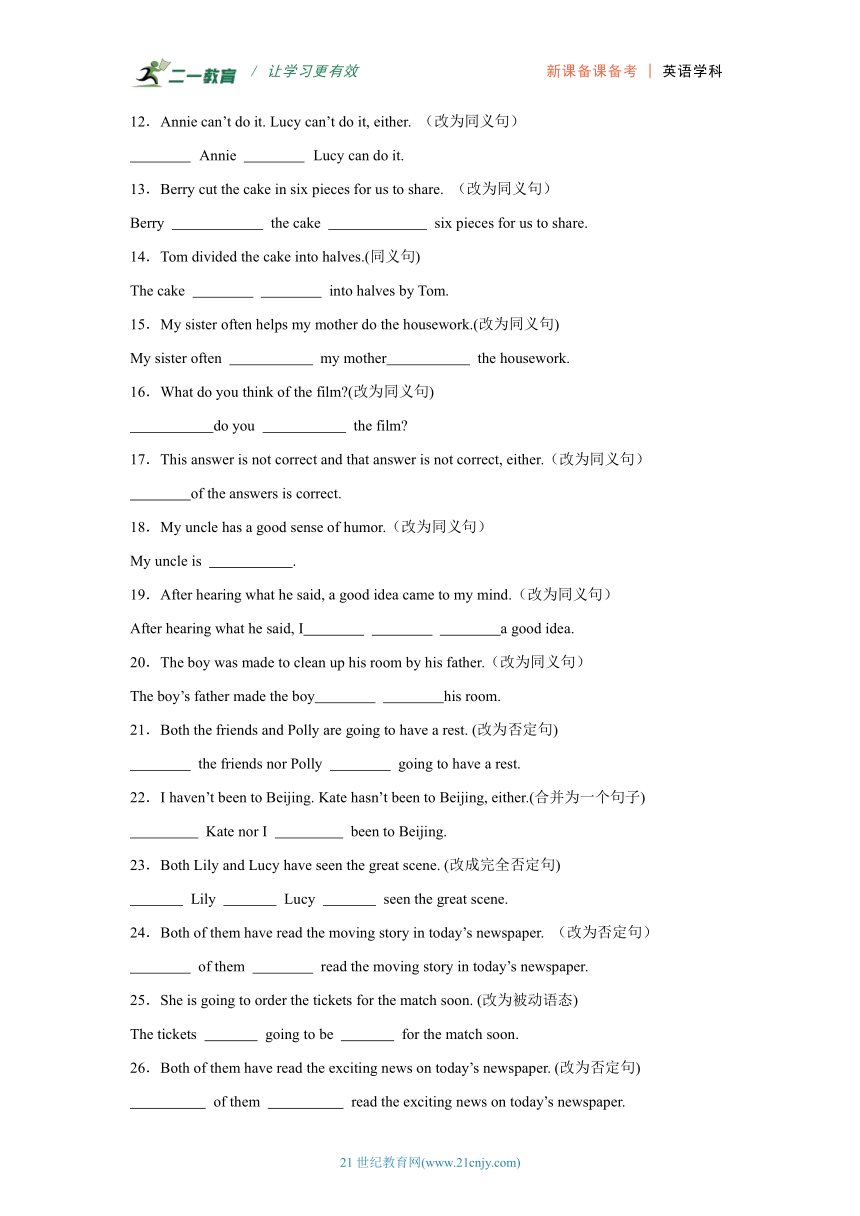
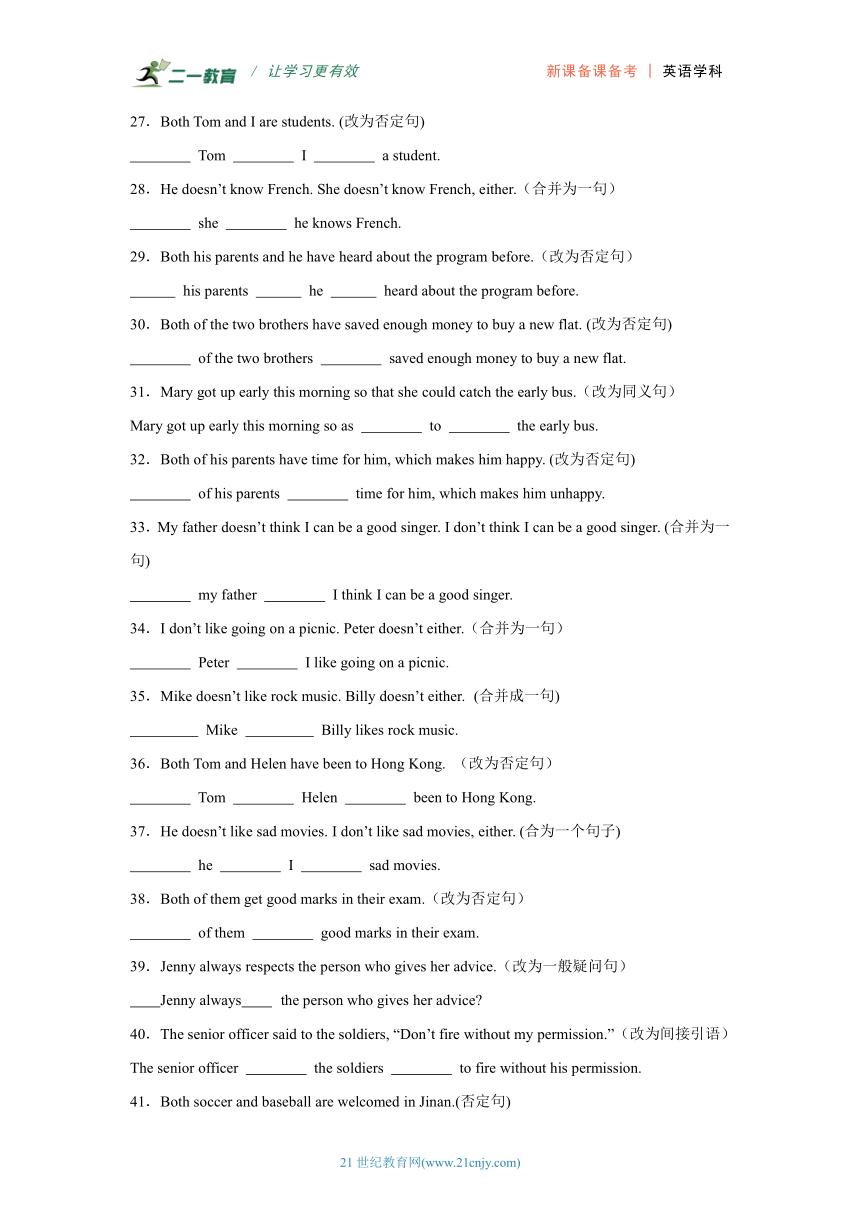
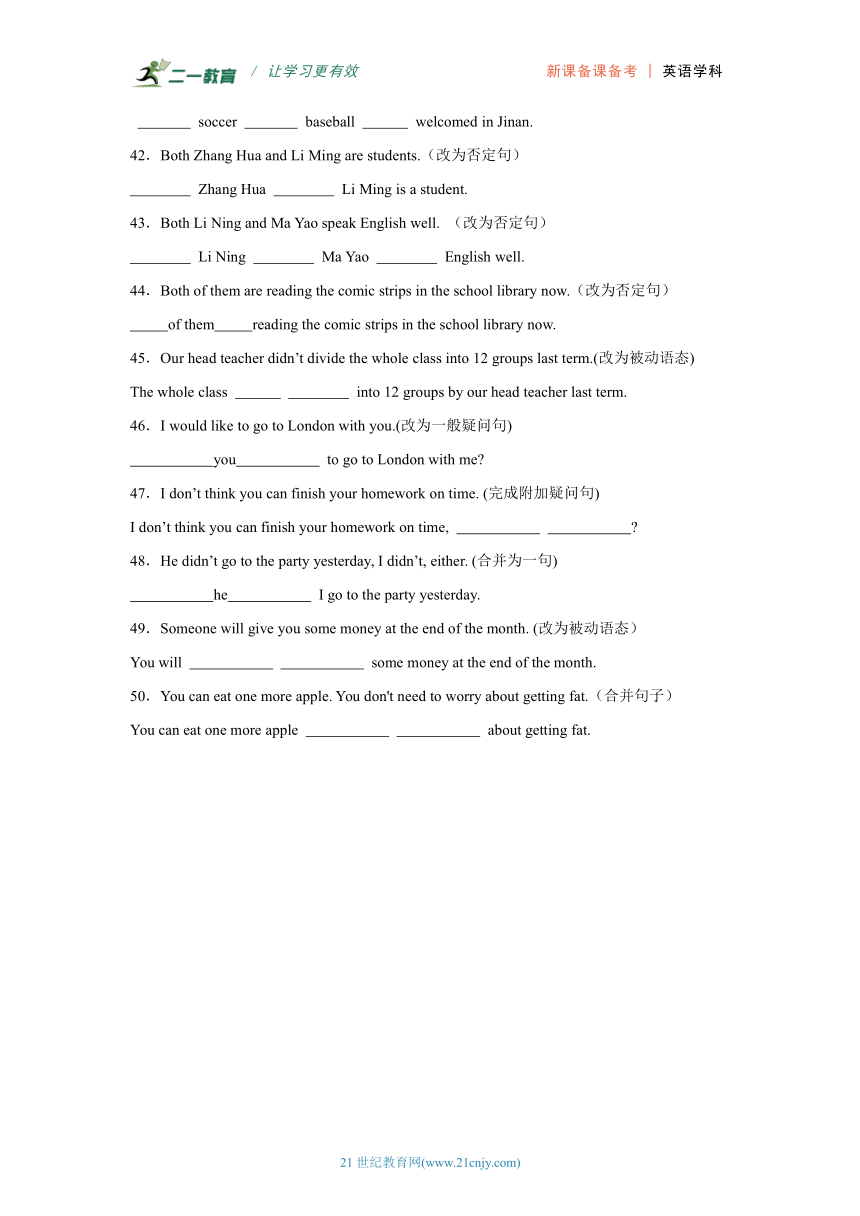
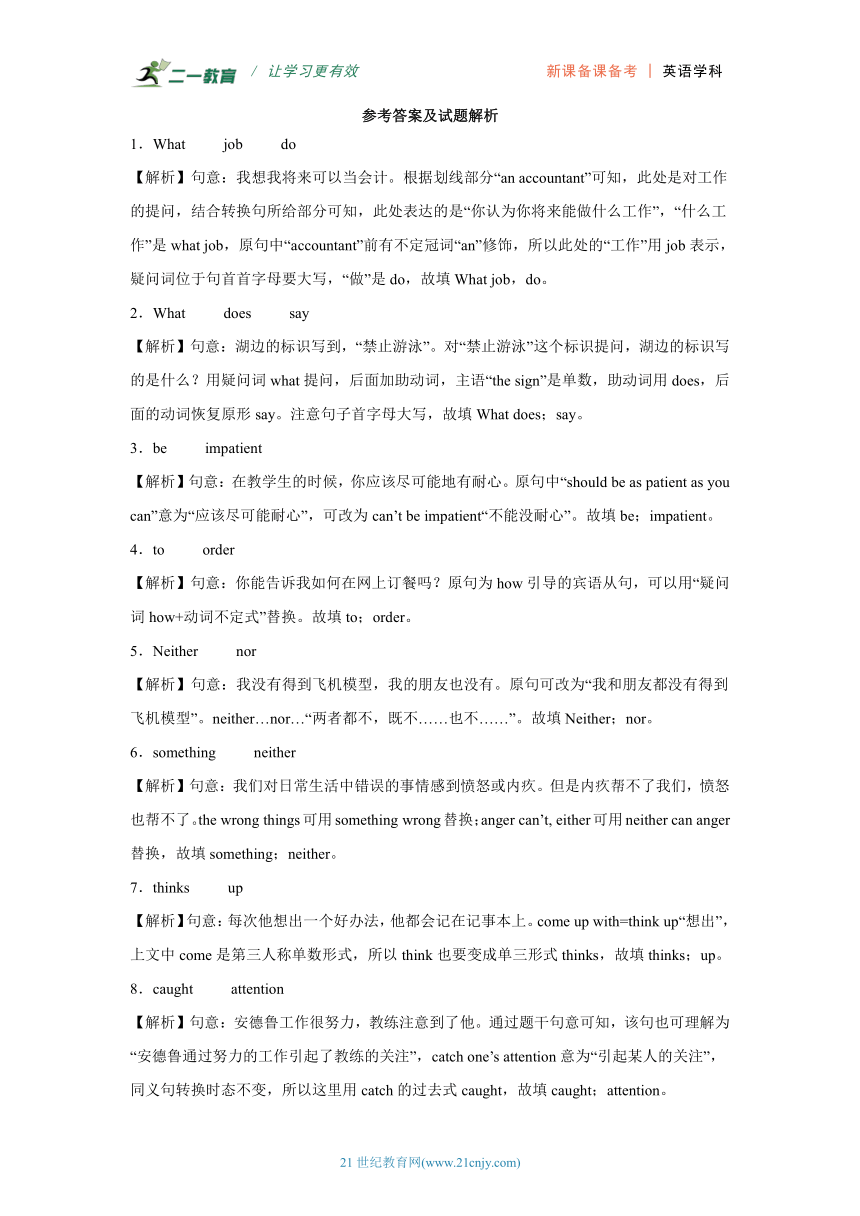
文档简介
/ 让学习更有效 新课备课备考 | 英语学科
/ 让学习更有效 新课备课备考 | 英语学科
2025-2026学年九年级英语上册单元复习考点培优牛津译林版Unit 1 Know yourself
专题07 句型转换
学校:___________姓名:___________班级:___________考号:___________
1.I think I can be an accountant in the future. (划线提问)
do you think I can in the future.
2.The sign by the lake says, “No swimming!”(对画线部分提问)
the sign by the lake
3.When teaching the students, you should be as patient as you can. (写出同义句)
When teaching the students, you can’t .
4.Can you tell me how I could order food online (改为同义句)
Can you tell me how food online
5.I didn’t get the model plane and my friend didn’t either.(改为同义句)
my friend I got the model plane.
6.We feel angry or guilty about the wrong things in our daily life. But guilt can’t help us, anger can’t, either.
We feel angry or guilty about wrong in our daily life. But guilt can’t help us, can anger.
7.Every time he comes up with a new idea, he writes it down in his notebook.(同义句转换)
Every time he a new idea, he writes it down in his notebook.
8.Andrew worked very hard and the coach took notice of him. (改为同义句)
Andrew the coach’s through hard work.
9.Both of his parents don’t like reading.(改为同义句)
his mother his father likes reading.
10.You don’t know Japanese, and I don’t know Japanese either. (同义句转换)
you I know Japanese.
11.We thought of a good method to solve the problem in the end.(保持句意不变)
We with a good method to solve the problem in the end.
12.Annie can’t do it. Lucy can’t do it, either. (改为同义句)
Annie Lucy can do it.
13.Berry cut the cake in six pieces for us to share. (改为同义句)
Berry the cake six pieces for us to share.
14.Tom divided the cake into halves.(同义句)
The cake into halves by Tom.
15.My sister often helps my mother do the housework.(改为同义句)
My sister often my mother the housework.
16.What do you think of the film (改为同义句)
do you the film
17.This answer is not correct and that answer is not correct, either.(改为同义句)
of the answers is correct.
18.My uncle has a good sense of humor.(改为同义句)
My uncle is .
19.After hearing what he said, a good idea came to my mind.(改为同义句)
After hearing what he said, I a good idea.
20.The boy was made to clean up his room by his father.(改为同义句)
The boy’s father made the boy his room.
21.Both the friends and Polly are going to have a rest. (改为否定句)
the friends nor Polly going to have a rest.
22.I haven’t been to Beijing. Kate hasn’t been to Beijing, either.(合并为一个句子)
Kate nor I been to Beijing.
23.Both Lily and Lucy have seen the great scene. (改成完全否定句)
Lily Lucy seen the great scene.
24.Both of them have read the moving story in today’s newspaper. (改为否定句)
of them read the moving story in today’s newspaper.
25.She is going to order the tickets for the match soon. (改为被动语态)
The tickets going to be for the match soon.
26.Both of them have read the exciting news on today’s newspaper. (改为否定句)
of them read the exciting news on today’s newspaper.
27.Both Tom and I are students. (改为否定句)
Tom I a student.
28.He doesn’t know French. She doesn’t know French, either.(合并为一句)
she he knows French.
29.Both his parents and he have heard about the program before.(改为否定句)
his parents he heard about the program before.
30.Both of the two brothers have saved enough money to buy a new flat. (改为否定句)
of the two brothers saved enough money to buy a new flat.
31.Mary got up early this morning so that she could catch the early bus.(改为同义句)
Mary got up early this morning so as to the early bus.
32.Both of his parents have time for him, which makes him happy. (改为否定句)
of his parents time for him, which makes him unhappy.
33.My father doesn’t think I can be a good singer. I don’t think I can be a good singer. (合并为一句)
my father I think I can be a good singer.
34.I don’t like going on a picnic. Peter doesn’t either.(合并为一句)
Peter I like going on a picnic.
35.Mike doesn’t like rock music. Billy doesn’t either. (合并成一句)
Mike Billy likes rock music.
36.Both Tom and Helen have been to Hong Kong. (改为否定句)
Tom Helen been to Hong Kong.
37.He doesn’t like sad movies. I don’t like sad movies, either. (合为一个句子)
he I sad movies.
38.Both of them get good marks in their exam.(改为否定句)
of them good marks in their exam.
39.Jenny always respects the person who gives her advice.(改为一般疑问句)
Jenny always the person who gives her advice
40.The senior officer said to the soldiers, “Don’t fire without my permission.”(改为间接引语)
The senior officer the soldiers to fire without his permission.
41.Both soccer and baseball are welcomed in Jinan.(否定句)
soccer baseball welcomed in Jinan.
42.Both Zhang Hua and Li Ming are students.(改为否定句)
Zhang Hua Li Ming is a student.
43.Both Li Ning and Ma Yao speak English well. (改为否定句)
Li Ning Ma Yao English well.
44.Both of them are reading the comic strips in the school library now.(改为否定句)
of them reading the comic strips in the school library now.
45.Our head teacher didn’t divide the whole class into 12 groups last term.(改为被动语态)
The whole class into 12 groups by our head teacher last term.
46.I would like to go to London with you.(改为一般疑问句)
you to go to London with me
47.I don’t think you can finish your homework on time. (完成附加疑问句)
I don’t think you can finish your homework on time,
48.He didn’t go to the party yesterday, I didn’t, either. (合并为一句)
he I go to the party yesterday.
49.Someone will give you some money at the end of the month. (改为被动语态)
You will some money at the end of the month.
50.You can eat one more apple. You don't need to worry about getting fat.(合并句子)
You can eat one more apple about getting fat.
/ 让学习更有效 新课备课备考 | 英语学科
/ 让学习更有效 新课备课备考 | 英语学科
21世纪教育网(www.21cnjy.com)
21世纪教育网(www.21cnjy.com)
参考答案及试题解析
1.What job do
【解析】句意:我想我将来可以当会计。根据划线部分“an accountant”可知,此处是对工作的提问,结合转换句所给部分可知,此处表达的是“你认为你将来能做什么工作”,“什么工作”是what job,原句中“accountant”前有不定冠词“an”修饰,所以此处的“工作”用job表示,疑问词位于句首首字母要大写,“做”是do,故填What job,do。
2.What does say
【解析】句意:湖边的标识写到,“禁止游泳”。对“禁止游泳”这个标识提问,湖边的标识写的是什么?用疑问词what提问,后面加助动词,主语“the sign”是单数,助动词用does,后面的动词恢复原形say。注意句子首字母大写,故填What does;say。
3.be impatient
【解析】句意:在教学生的时候,你应该尽可能地有耐心。原句中“should be as patient as you can”意为“应该尽可能耐心”,可改为can’t be impatient“不能没耐心”。故填be;impatient。
4.to order
【解析】句意:你能告诉我如何在网上订餐吗?原句为how引导的宾语从句,可以用“疑问词how+动词不定式”替换。故填to;order。
5.Neither nor
【解析】句意:我没有得到飞机模型,我的朋友也没有。原句可改为“我和朋友都没有得到飞机模型”。neither…nor…“两者都不,既不……也不……”。故填Neither;nor。
6.something neither
【解析】句意:我们对日常生活中错误的事情感到愤怒或内疚。但是内疚帮不了我们,愤怒也帮不了。the wrong things可用something wrong替换;anger can’t, either可用neither can anger替换,故填something;neither。
7.thinks up
【解析】句意:每次他想出一个好办法,他都会记在记事本上。come up with=think up“想出”,上文中come是第三人称单数形式,所以think也要变成单三形式thinks,故填thinks;up。
8.caught attention
【解析】句意:安德鲁工作很努力,教练注意到了他。通过题干句意可知,该句也可理解为“安德鲁通过努力的工作引起了教练的关注”,catch one’s attention意为“引起某人的关注”,同义句转换时态不变,所以这里用catch的过去式caught,故填caught;attention。
9.Neither nor
【解析】句意:他的父母都不喜欢读书。根据题意可知同义句为“他的妈妈和他的爸爸都不喜欢阅读”。neither A nor B译为“A和B都不”,当这个结构作主语时,谓语动词遵循就近原则。故填Neither;nor。
10.Neither nor
【解析】句意:你不懂日语,我也不懂。原句意思是“你和我两个人都不懂日语”,英语中用neither…nor表示两者都不,连接两个并列主语时遵循就近原则。句首单词的首字母需大写,故填Neither; nor。
11.came up
【解析】句意:我们最后想出了解决这个问题的好办法。动词短语think of a good method“想起一个好办法”= come up with a good method“想出一个好办法”;原句是一般过去时;故填came;up。
12.Neither nor
【解析】句意:安妮做不到。露西也做不到。改为同义句,则表达为“安妮和露西都做不到”,可以用neither...nor...连接两个主语,表示“既不……也不……”。故填Neither;nor。
13.divided into
【解析】句意:贝瑞把蛋糕切成六块,分给我们吃。题目要求改为同义句,根据原句中“cut the cake in six pieces”可知,句中时态为一般过去时,此处可以使用divide sth. into…代替cut sth. in…,divide的过去式形式为divided。故填divided;into。
14.was divided
【解析】句意:Tom把蛋糕分成了两半。本题要求改为同义句,由题干“…into halves by Tom”可知,该句用被动语态表达原句的意思;原句使用的是一般过去时,主语“The cake”是单数,be动词用was。故填was; divided。
15.helps with
【解析】句意:我妹妹经常帮助我妈妈做家务。原句helps是动词的三单形式,可知是一般现在时态;短语help sb. do sth.“帮助某人做某事”,和“help sb. with sth.”同义。主语My sister是单数第三人称,动词需用三单形式,故填①helps②with。
16.How like
【解析】句意:你觉得这部电影怎么样?英语中询问对方对事物的看法时用“What do you think of... ”或者“How do you like... ”,所以此处可以用How问句替换,故填How,like。
17.Neither
【解析】句意:这个答案不正确,那个答案也不正确。原句表达的意思是“两个答案都不正确”。neither表示两者都不,用在句首需大写首字母,故填Neither。
18.humorous
【解析】句意:我叔叔很有幽默感。原句用的是名词,此处可以用形容词humorous,表示“幽默的”,放在“is”后面作表语,故填humorous。
19.came up with
【解析】句意:听完他说的话后,我想到了一个好主意。分析句子结构可知,此处缺少谓语;想出,提出:come up with;由提示词came可知,此题的时态为一般过去时,come的过去式为came。故填①came②up③with。
20.clean up
【解析】句意:那男孩被他父亲要求打扫他的房间。原句是被动结构be made to do sth,转换之后句子主语是“The boy’s father”,是主动结构,此处表达的是“让某人做某事”,英语是make sb do sth,所以空格用省略to的不定式作宾补,故填clean up。
21.Neither is
【解析】句意:朋友们和波莉都要去休息了。根据题干可知,改为否定句,将原句中的both and改成neither nor,将原句中的be动词are改为is,句首单词首字母大写。故填Neither;is。
22.Neither have
【解析】句意:我没去过北京。凯特也没去过北京。结合句意是说两者都不,联系下文的nor用neither…nor…既不……也不……,连接两个对等成分做主语,谓语动词遵循就近原则,这里是现在完成时,I与have连用。故填Neither;have。
23.Neither nor has
【解析】句意:莉莉和露西都看过这壮观的场面。改为完全否定句,应用短语neither…nor…“既不……也不……”,连接并列主语时,遵循“就近原则”,且句首首字母要大写;句子时态为现在完成时,其结构为“have/has done”,第三个空前为Lucy,助动词应用has。故填Neither;nor;has。
24.Neither has
【解析】句意:他们两人都在今天的报纸上读到了这个感人的故事。both“两者都”,否定词neither“两者都不”,作主语时谓语动词用三单,have改为has。故填Neither;has。
25.are ordered
【解析】句意:她将很快订购比赛的门票。此处改为被动语态,The tickets作主语,be动词用are;被动语态谓语动词构成是be done,此处用order的过去分词形式ordered。故填are;ordered。
26.Neither has
【解析】句意:他们俩都读了今天报纸上那条令人兴奋的消息。both表示两者之间的“都”,否定是neither,neither of修饰名词,谓语用三单,所以第二空应填has,故填Neither;has。
27.Neither nor am
【解析】句意:汤姆和我都是学生。改为否定句需要用neither…nor…“两者都不”,句首字母要大写,原句为一般现在时,根据就近原则,第三空的系动词应用am,故填Neither;nor;am。
28.Neither nor
【解析】句意:他不会法语,她也不会法语。根据“He doesn’t know French. She doesn’t know French, either.”可知,她和他都不会法语。neither...nor...“既不……也不……”,表示“两者都不”。故填Neither;nor。
29.Neither nor has
【解析】句意:他的父母和他以前都听说过这个节目。both...and“两者都”,其对应的否定形式为neither...nor“既不……也不……”,遵循“就近原则”,第三空离he最近,助动词用三单形式has。故填Neither;nor;has。
30.Neither has
【解析】句意:这两个兄弟都已经存了足够的钱来买一个新的公寓。根据题目要求改为否定句。both两者都,neither两者都不。当neither of+名词作主语时,谓语动词用单数。根据第一句话中的have saved可知,第二空处用has。句首单词首字母大写,故填Neither;has。
31.not miss
【解析】句意:玛丽今天早上起得很早,以便能赶上早班车。题目要求改为同义句。由上句知所填空处表示“以便不错过”,miss“错过”,动词,so as not to do sth.表示“以便不会做某事”,结合空格数,故填not;miss。
32.Neither has/have
【解析】句意:他的父母都有时间陪他,这使他很高兴。both“两者都”,表示肯定,作主语时,谓语动词用复数,neither“两者都不”,表示否定, neither作主语时,谓语动词在大多数情况下用第三人称单数形式,“neither of...”作主语,谓语动词可以用单数形式,也可以用复数形式。句子开头,首字母要大写,have的三单形式是has,故填Neither;has/have。
33.Neither nor
【解析】句意:我父亲不认为我能成为一名优秀的歌手。我不认为我能成为一名优秀的歌手。此处表示两人都不认为“我”能成为一名优秀的歌手,应用“既不……也不……”表示,因此填neither…nor。句首首字母大写。故填Neither;nor。
34.Neither nor
【解析】句意:我不喜欢去野餐。彼得也不喜欢。题目要求合并为一句,即“彼得和我都不喜欢去野餐”。Neither … nor …意为“两者都不”,符合句意,故填Neither;nor。
35.Neither nor
【解析】句意:Mike不喜欢摇滚乐。Billy也不喜欢。合并成一句后句意为“Mike和Billy都不喜欢摇滚乐”;根据句意表示“两者都不……”,应该是“neither...nor...”,注意首字母大写,故填Neither;nor。
36.Neither nor has
【解析】句意:汤姆和海伦都去过香港。both…and表示“……和……都”,否定用neither…nor,连接并列主语,谓语遵循“就近原则”,离谓语最近的Helen是第三人称单数形式,助动词用has,故填Neither;nor;has。
37.Neither nor like
【解析】句意:他不喜欢悲伤的电影。我也不喜欢悲伤的电影。根据题意可知是“我和他都不喜欢悲伤的电影”,neither…nor…“两者都不”,连接两个主语,谓语动词采用就近原则,一般现在时态,最近的主语是I,like“喜欢”,是动词,此处用原形,故填Neither;nor ;like。
38.Neither gets
【解析】句意:他们俩在考试中都取得了好成绩。根据“Both of them”和题目要求可知,“两者都”的否定是“两者都不”,所以第一空应填“neither(两者都不)”,句首首字母n应大写;根据原形动词“get”可知,此句时态用一般现在时,neither作主语时谓语动词常用单数形式,所以第二空应填get的单数形式gets。故填Neither;gets。
39.Does respect
【解析】句意:珍妮总是尊重给她建议的人。根据提示改为一般疑问句,谓语是respects“尊重”,可知是一般现在时态,主语是Jenny,是第三人称单数,变成一般疑问句,要借助助动词does,其结构是Does+主语+动词原形,故填Does;respect。
40.told/ordered not
【解析】句意:高级军官对士兵们说:“没有我的允许,不要开火。”改为间接引语,直接引语中出现said to,间接引语应该改为told或ordered;直接引语为祈使句,间接引语要用动词不定式,否定not要放在动词不定式前,即told/ordered sb not to do sth。故填told/ordered;not。
41.Neither nor is
【解析】句意:足球和棒球在济南都很受欢迎。原句中用到both…and…两者都,变为否定即变为“两者都不”,即neither…nor,此时谓语动词要用就近原则,baseball为单数,be动词用is。故填Neither;nor;is。
42.Neither of
【解析】句意:张华和李明都是学生。both…and“两者都……”,否定表达的是“两者都不”,应用neither…nor的形式,位于句首首字母要大写,故填Neither,nor。
43.Neither nor speaks
【解析】句意:李宁和马瑶英语都说得很好。both...and...表示“两者都……”,其对应的反义词是neither...nor...“既不……也不……”,作主语,谓语动词采用“就近原则”,主语是第三人称单数,所以speak要用三单形式。故填Neither;nor;speaks。
44.Neither is
【解析】句意:他们俩现在都在学校图书馆看连环漫画。本题考查肯定句变否定句。both,两个都,其对应的否定意义的词是neither,两者都不,句首首字母大写;做主语时,谓语动词用第三人称单数形式;本句是现在进行时,故助动词应用is。故填Neither;is。
45.wasn’t divided
【解析】句意:上学期我们班主任没有把全班分成12组。根据给出原句可知,句子时态为一般过去时,且为否定句;一般过去时的被动语态结构的否定为“was/were+not+动词过去分词”;主语“The whole class”是第三人称单数,be动词用was,加上not后缩写为“wasn't”;动词“divide”的过去分词形式为“divided”,故填wasn't;divided。
46.Would like
【解析】句意:我想和你一起去伦敦。原句中有情态动词would,疑问句直接把would提到主语前,位于句首首字母大写,故填Would,like。
47.can you
【解析】句意:我认为你不能按时完成你的作业。原句是一个宾语从句,且主句主语是第一人称I,动词是think,在从句表达否定时把否定转移到主句上,但翻译时还是翻译到从句上,变成反意疑问句时,要根据从句一致;从句是否定句,所以反意疑问句部分要用肯定的形式,从句中有情态动词can,所以反意疑问句直接用情态动词构成,后接从句主语,故填can you。
48.Neither nor
【解析】句意:他昨天没有去参加聚会,我也没有。此处表达的是两个人都没有去,可以用neither...nor的形式,表示“两者都不”,故填Neither,nor。
49.be given
【解析】句意:月底会有人给你一些钱。原句用的是一般将来时,故变成被动用一般将来时的被动,结构是“will be+过去分词”,give的过去分词是given,故填be given。
50.without worrying
【解析】句意:你可以再吃一个苹果。你不必担心发胖。此处可以用“without+doing”的结构,表示“不必做某事”,without是介词,后接动名词作宾语,故填without worrying。
21世纪教育网(www.21cnjy.com)
21世纪教育网(www.21cnjy.com)
/ 让学习更有效 新课备课备考 | 英语学科
2025-2026学年九年级英语上册单元复习考点培优牛津译林版Unit 1 Know yourself
专题07 句型转换
学校:___________姓名:___________班级:___________考号:___________
1.I think I can be an accountant in the future. (划线提问)
do you think I can in the future.
2.The sign by the lake says, “No swimming!”(对画线部分提问)
the sign by the lake
3.When teaching the students, you should be as patient as you can. (写出同义句)
When teaching the students, you can’t .
4.Can you tell me how I could order food online (改为同义句)
Can you tell me how food online
5.I didn’t get the model plane and my friend didn’t either.(改为同义句)
my friend I got the model plane.
6.We feel angry or guilty about the wrong things in our daily life. But guilt can’t help us, anger can’t, either.
We feel angry or guilty about wrong in our daily life. But guilt can’t help us, can anger.
7.Every time he comes up with a new idea, he writes it down in his notebook.(同义句转换)
Every time he a new idea, he writes it down in his notebook.
8.Andrew worked very hard and the coach took notice of him. (改为同义句)
Andrew the coach’s through hard work.
9.Both of his parents don’t like reading.(改为同义句)
his mother his father likes reading.
10.You don’t know Japanese, and I don’t know Japanese either. (同义句转换)
you I know Japanese.
11.We thought of a good method to solve the problem in the end.(保持句意不变)
We with a good method to solve the problem in the end.
12.Annie can’t do it. Lucy can’t do it, either. (改为同义句)
Annie Lucy can do it.
13.Berry cut the cake in six pieces for us to share. (改为同义句)
Berry the cake six pieces for us to share.
14.Tom divided the cake into halves.(同义句)
The cake into halves by Tom.
15.My sister often helps my mother do the housework.(改为同义句)
My sister often my mother the housework.
16.What do you think of the film (改为同义句)
do you the film
17.This answer is not correct and that answer is not correct, either.(改为同义句)
of the answers is correct.
18.My uncle has a good sense of humor.(改为同义句)
My uncle is .
19.After hearing what he said, a good idea came to my mind.(改为同义句)
After hearing what he said, I a good idea.
20.The boy was made to clean up his room by his father.(改为同义句)
The boy’s father made the boy his room.
21.Both the friends and Polly are going to have a rest. (改为否定句)
the friends nor Polly going to have a rest.
22.I haven’t been to Beijing. Kate hasn’t been to Beijing, either.(合并为一个句子)
Kate nor I been to Beijing.
23.Both Lily and Lucy have seen the great scene. (改成完全否定句)
Lily Lucy seen the great scene.
24.Both of them have read the moving story in today’s newspaper. (改为否定句)
of them read the moving story in today’s newspaper.
25.She is going to order the tickets for the match soon. (改为被动语态)
The tickets going to be for the match soon.
26.Both of them have read the exciting news on today’s newspaper. (改为否定句)
of them read the exciting news on today’s newspaper.
27.Both Tom and I are students. (改为否定句)
Tom I a student.
28.He doesn’t know French. She doesn’t know French, either.(合并为一句)
she he knows French.
29.Both his parents and he have heard about the program before.(改为否定句)
his parents he heard about the program before.
30.Both of the two brothers have saved enough money to buy a new flat. (改为否定句)
of the two brothers saved enough money to buy a new flat.
31.Mary got up early this morning so that she could catch the early bus.(改为同义句)
Mary got up early this morning so as to the early bus.
32.Both of his parents have time for him, which makes him happy. (改为否定句)
of his parents time for him, which makes him unhappy.
33.My father doesn’t think I can be a good singer. I don’t think I can be a good singer. (合并为一句)
my father I think I can be a good singer.
34.I don’t like going on a picnic. Peter doesn’t either.(合并为一句)
Peter I like going on a picnic.
35.Mike doesn’t like rock music. Billy doesn’t either. (合并成一句)
Mike Billy likes rock music.
36.Both Tom and Helen have been to Hong Kong. (改为否定句)
Tom Helen been to Hong Kong.
37.He doesn’t like sad movies. I don’t like sad movies, either. (合为一个句子)
he I sad movies.
38.Both of them get good marks in their exam.(改为否定句)
of them good marks in their exam.
39.Jenny always respects the person who gives her advice.(改为一般疑问句)
Jenny always the person who gives her advice
40.The senior officer said to the soldiers, “Don’t fire without my permission.”(改为间接引语)
The senior officer the soldiers to fire without his permission.
41.Both soccer and baseball are welcomed in Jinan.(否定句)
soccer baseball welcomed in Jinan.
42.Both Zhang Hua and Li Ming are students.(改为否定句)
Zhang Hua Li Ming is a student.
43.Both Li Ning and Ma Yao speak English well. (改为否定句)
Li Ning Ma Yao English well.
44.Both of them are reading the comic strips in the school library now.(改为否定句)
of them reading the comic strips in the school library now.
45.Our head teacher didn’t divide the whole class into 12 groups last term.(改为被动语态)
The whole class into 12 groups by our head teacher last term.
46.I would like to go to London with you.(改为一般疑问句)
you to go to London with me
47.I don’t think you can finish your homework on time. (完成附加疑问句)
I don’t think you can finish your homework on time,
48.He didn’t go to the party yesterday, I didn’t, either. (合并为一句)
he I go to the party yesterday.
49.Someone will give you some money at the end of the month. (改为被动语态)
You will some money at the end of the month.
50.You can eat one more apple. You don't need to worry about getting fat.(合并句子)
You can eat one more apple about getting fat.
/ 让学习更有效 新课备课备考 | 英语学科
/ 让学习更有效 新课备课备考 | 英语学科
21世纪教育网(www.21cnjy.com)
21世纪教育网(www.21cnjy.com)
参考答案及试题解析
1.What job do
【解析】句意:我想我将来可以当会计。根据划线部分“an accountant”可知,此处是对工作的提问,结合转换句所给部分可知,此处表达的是“你认为你将来能做什么工作”,“什么工作”是what job,原句中“accountant”前有不定冠词“an”修饰,所以此处的“工作”用job表示,疑问词位于句首首字母要大写,“做”是do,故填What job,do。
2.What does say
【解析】句意:湖边的标识写到,“禁止游泳”。对“禁止游泳”这个标识提问,湖边的标识写的是什么?用疑问词what提问,后面加助动词,主语“the sign”是单数,助动词用does,后面的动词恢复原形say。注意句子首字母大写,故填What does;say。
3.be impatient
【解析】句意:在教学生的时候,你应该尽可能地有耐心。原句中“should be as patient as you can”意为“应该尽可能耐心”,可改为can’t be impatient“不能没耐心”。故填be;impatient。
4.to order
【解析】句意:你能告诉我如何在网上订餐吗?原句为how引导的宾语从句,可以用“疑问词how+动词不定式”替换。故填to;order。
5.Neither nor
【解析】句意:我没有得到飞机模型,我的朋友也没有。原句可改为“我和朋友都没有得到飞机模型”。neither…nor…“两者都不,既不……也不……”。故填Neither;nor。
6.something neither
【解析】句意:我们对日常生活中错误的事情感到愤怒或内疚。但是内疚帮不了我们,愤怒也帮不了。the wrong things可用something wrong替换;anger can’t, either可用neither can anger替换,故填something;neither。
7.thinks up
【解析】句意:每次他想出一个好办法,他都会记在记事本上。come up with=think up“想出”,上文中come是第三人称单数形式,所以think也要变成单三形式thinks,故填thinks;up。
8.caught attention
【解析】句意:安德鲁工作很努力,教练注意到了他。通过题干句意可知,该句也可理解为“安德鲁通过努力的工作引起了教练的关注”,catch one’s attention意为“引起某人的关注”,同义句转换时态不变,所以这里用catch的过去式caught,故填caught;attention。
9.Neither nor
【解析】句意:他的父母都不喜欢读书。根据题意可知同义句为“他的妈妈和他的爸爸都不喜欢阅读”。neither A nor B译为“A和B都不”,当这个结构作主语时,谓语动词遵循就近原则。故填Neither;nor。
10.Neither nor
【解析】句意:你不懂日语,我也不懂。原句意思是“你和我两个人都不懂日语”,英语中用neither…nor表示两者都不,连接两个并列主语时遵循就近原则。句首单词的首字母需大写,故填Neither; nor。
11.came up
【解析】句意:我们最后想出了解决这个问题的好办法。动词短语think of a good method“想起一个好办法”= come up with a good method“想出一个好办法”;原句是一般过去时;故填came;up。
12.Neither nor
【解析】句意:安妮做不到。露西也做不到。改为同义句,则表达为“安妮和露西都做不到”,可以用neither...nor...连接两个主语,表示“既不……也不……”。故填Neither;nor。
13.divided into
【解析】句意:贝瑞把蛋糕切成六块,分给我们吃。题目要求改为同义句,根据原句中“cut the cake in six pieces”可知,句中时态为一般过去时,此处可以使用divide sth. into…代替cut sth. in…,divide的过去式形式为divided。故填divided;into。
14.was divided
【解析】句意:Tom把蛋糕分成了两半。本题要求改为同义句,由题干“…into halves by Tom”可知,该句用被动语态表达原句的意思;原句使用的是一般过去时,主语“The cake”是单数,be动词用was。故填was; divided。
15.helps with
【解析】句意:我妹妹经常帮助我妈妈做家务。原句helps是动词的三单形式,可知是一般现在时态;短语help sb. do sth.“帮助某人做某事”,和“help sb. with sth.”同义。主语My sister是单数第三人称,动词需用三单形式,故填①helps②with。
16.How like
【解析】句意:你觉得这部电影怎么样?英语中询问对方对事物的看法时用“What do you think of... ”或者“How do you like... ”,所以此处可以用How问句替换,故填How,like。
17.Neither
【解析】句意:这个答案不正确,那个答案也不正确。原句表达的意思是“两个答案都不正确”。neither表示两者都不,用在句首需大写首字母,故填Neither。
18.humorous
【解析】句意:我叔叔很有幽默感。原句用的是名词,此处可以用形容词humorous,表示“幽默的”,放在“is”后面作表语,故填humorous。
19.came up with
【解析】句意:听完他说的话后,我想到了一个好主意。分析句子结构可知,此处缺少谓语;想出,提出:come up with;由提示词came可知,此题的时态为一般过去时,come的过去式为came。故填①came②up③with。
20.clean up
【解析】句意:那男孩被他父亲要求打扫他的房间。原句是被动结构be made to do sth,转换之后句子主语是“The boy’s father”,是主动结构,此处表达的是“让某人做某事”,英语是make sb do sth,所以空格用省略to的不定式作宾补,故填clean up。
21.Neither is
【解析】句意:朋友们和波莉都要去休息了。根据题干可知,改为否定句,将原句中的both and改成neither nor,将原句中的be动词are改为is,句首单词首字母大写。故填Neither;is。
22.Neither have
【解析】句意:我没去过北京。凯特也没去过北京。结合句意是说两者都不,联系下文的nor用neither…nor…既不……也不……,连接两个对等成分做主语,谓语动词遵循就近原则,这里是现在完成时,I与have连用。故填Neither;have。
23.Neither nor has
【解析】句意:莉莉和露西都看过这壮观的场面。改为完全否定句,应用短语neither…nor…“既不……也不……”,连接并列主语时,遵循“就近原则”,且句首首字母要大写;句子时态为现在完成时,其结构为“have/has done”,第三个空前为Lucy,助动词应用has。故填Neither;nor;has。
24.Neither has
【解析】句意:他们两人都在今天的报纸上读到了这个感人的故事。both“两者都”,否定词neither“两者都不”,作主语时谓语动词用三单,have改为has。故填Neither;has。
25.are ordered
【解析】句意:她将很快订购比赛的门票。此处改为被动语态,The tickets作主语,be动词用are;被动语态谓语动词构成是be done,此处用order的过去分词形式ordered。故填are;ordered。
26.Neither has
【解析】句意:他们俩都读了今天报纸上那条令人兴奋的消息。both表示两者之间的“都”,否定是neither,neither of修饰名词,谓语用三单,所以第二空应填has,故填Neither;has。
27.Neither nor am
【解析】句意:汤姆和我都是学生。改为否定句需要用neither…nor…“两者都不”,句首字母要大写,原句为一般现在时,根据就近原则,第三空的系动词应用am,故填Neither;nor;am。
28.Neither nor
【解析】句意:他不会法语,她也不会法语。根据“He doesn’t know French. She doesn’t know French, either.”可知,她和他都不会法语。neither...nor...“既不……也不……”,表示“两者都不”。故填Neither;nor。
29.Neither nor has
【解析】句意:他的父母和他以前都听说过这个节目。both...and“两者都”,其对应的否定形式为neither...nor“既不……也不……”,遵循“就近原则”,第三空离he最近,助动词用三单形式has。故填Neither;nor;has。
30.Neither has
【解析】句意:这两个兄弟都已经存了足够的钱来买一个新的公寓。根据题目要求改为否定句。both两者都,neither两者都不。当neither of+名词作主语时,谓语动词用单数。根据第一句话中的have saved可知,第二空处用has。句首单词首字母大写,故填Neither;has。
31.not miss
【解析】句意:玛丽今天早上起得很早,以便能赶上早班车。题目要求改为同义句。由上句知所填空处表示“以便不错过”,miss“错过”,动词,so as not to do sth.表示“以便不会做某事”,结合空格数,故填not;miss。
32.Neither has/have
【解析】句意:他的父母都有时间陪他,这使他很高兴。both“两者都”,表示肯定,作主语时,谓语动词用复数,neither“两者都不”,表示否定, neither作主语时,谓语动词在大多数情况下用第三人称单数形式,“neither of...”作主语,谓语动词可以用单数形式,也可以用复数形式。句子开头,首字母要大写,have的三单形式是has,故填Neither;has/have。
33.Neither nor
【解析】句意:我父亲不认为我能成为一名优秀的歌手。我不认为我能成为一名优秀的歌手。此处表示两人都不认为“我”能成为一名优秀的歌手,应用“既不……也不……”表示,因此填neither…nor。句首首字母大写。故填Neither;nor。
34.Neither nor
【解析】句意:我不喜欢去野餐。彼得也不喜欢。题目要求合并为一句,即“彼得和我都不喜欢去野餐”。Neither … nor …意为“两者都不”,符合句意,故填Neither;nor。
35.Neither nor
【解析】句意:Mike不喜欢摇滚乐。Billy也不喜欢。合并成一句后句意为“Mike和Billy都不喜欢摇滚乐”;根据句意表示“两者都不……”,应该是“neither...nor...”,注意首字母大写,故填Neither;nor。
36.Neither nor has
【解析】句意:汤姆和海伦都去过香港。both…and表示“……和……都”,否定用neither…nor,连接并列主语,谓语遵循“就近原则”,离谓语最近的Helen是第三人称单数形式,助动词用has,故填Neither;nor;has。
37.Neither nor like
【解析】句意:他不喜欢悲伤的电影。我也不喜欢悲伤的电影。根据题意可知是“我和他都不喜欢悲伤的电影”,neither…nor…“两者都不”,连接两个主语,谓语动词采用就近原则,一般现在时态,最近的主语是I,like“喜欢”,是动词,此处用原形,故填Neither;nor ;like。
38.Neither gets
【解析】句意:他们俩在考试中都取得了好成绩。根据“Both of them”和题目要求可知,“两者都”的否定是“两者都不”,所以第一空应填“neither(两者都不)”,句首首字母n应大写;根据原形动词“get”可知,此句时态用一般现在时,neither作主语时谓语动词常用单数形式,所以第二空应填get的单数形式gets。故填Neither;gets。
39.Does respect
【解析】句意:珍妮总是尊重给她建议的人。根据提示改为一般疑问句,谓语是respects“尊重”,可知是一般现在时态,主语是Jenny,是第三人称单数,变成一般疑问句,要借助助动词does,其结构是Does+主语+动词原形,故填Does;respect。
40.told/ordered not
【解析】句意:高级军官对士兵们说:“没有我的允许,不要开火。”改为间接引语,直接引语中出现said to,间接引语应该改为told或ordered;直接引语为祈使句,间接引语要用动词不定式,否定not要放在动词不定式前,即told/ordered sb not to do sth。故填told/ordered;not。
41.Neither nor is
【解析】句意:足球和棒球在济南都很受欢迎。原句中用到both…and…两者都,变为否定即变为“两者都不”,即neither…nor,此时谓语动词要用就近原则,baseball为单数,be动词用is。故填Neither;nor;is。
42.Neither of
【解析】句意:张华和李明都是学生。both…and“两者都……”,否定表达的是“两者都不”,应用neither…nor的形式,位于句首首字母要大写,故填Neither,nor。
43.Neither nor speaks
【解析】句意:李宁和马瑶英语都说得很好。both...and...表示“两者都……”,其对应的反义词是neither...nor...“既不……也不……”,作主语,谓语动词采用“就近原则”,主语是第三人称单数,所以speak要用三单形式。故填Neither;nor;speaks。
44.Neither is
【解析】句意:他们俩现在都在学校图书馆看连环漫画。本题考查肯定句变否定句。both,两个都,其对应的否定意义的词是neither,两者都不,句首首字母大写;做主语时,谓语动词用第三人称单数形式;本句是现在进行时,故助动词应用is。故填Neither;is。
45.wasn’t divided
【解析】句意:上学期我们班主任没有把全班分成12组。根据给出原句可知,句子时态为一般过去时,且为否定句;一般过去时的被动语态结构的否定为“was/were+not+动词过去分词”;主语“The whole class”是第三人称单数,be动词用was,加上not后缩写为“wasn't”;动词“divide”的过去分词形式为“divided”,故填wasn't;divided。
46.Would like
【解析】句意:我想和你一起去伦敦。原句中有情态动词would,疑问句直接把would提到主语前,位于句首首字母大写,故填Would,like。
47.can you
【解析】句意:我认为你不能按时完成你的作业。原句是一个宾语从句,且主句主语是第一人称I,动词是think,在从句表达否定时把否定转移到主句上,但翻译时还是翻译到从句上,变成反意疑问句时,要根据从句一致;从句是否定句,所以反意疑问句部分要用肯定的形式,从句中有情态动词can,所以反意疑问句直接用情态动词构成,后接从句主语,故填can you。
48.Neither nor
【解析】句意:他昨天没有去参加聚会,我也没有。此处表达的是两个人都没有去,可以用neither...nor的形式,表示“两者都不”,故填Neither,nor。
49.be given
【解析】句意:月底会有人给你一些钱。原句用的是一般将来时,故变成被动用一般将来时的被动,结构是“will be+过去分词”,give的过去分词是given,故填be given。
50.without worrying
【解析】句意:你可以再吃一个苹果。你不必担心发胖。此处可以用“without+doing”的结构,表示“不必做某事”,without是介词,后接动名词作宾语,故填without worrying。
21世纪教育网(www.21cnjy.com)
21世纪教育网(www.21cnjy.com)
